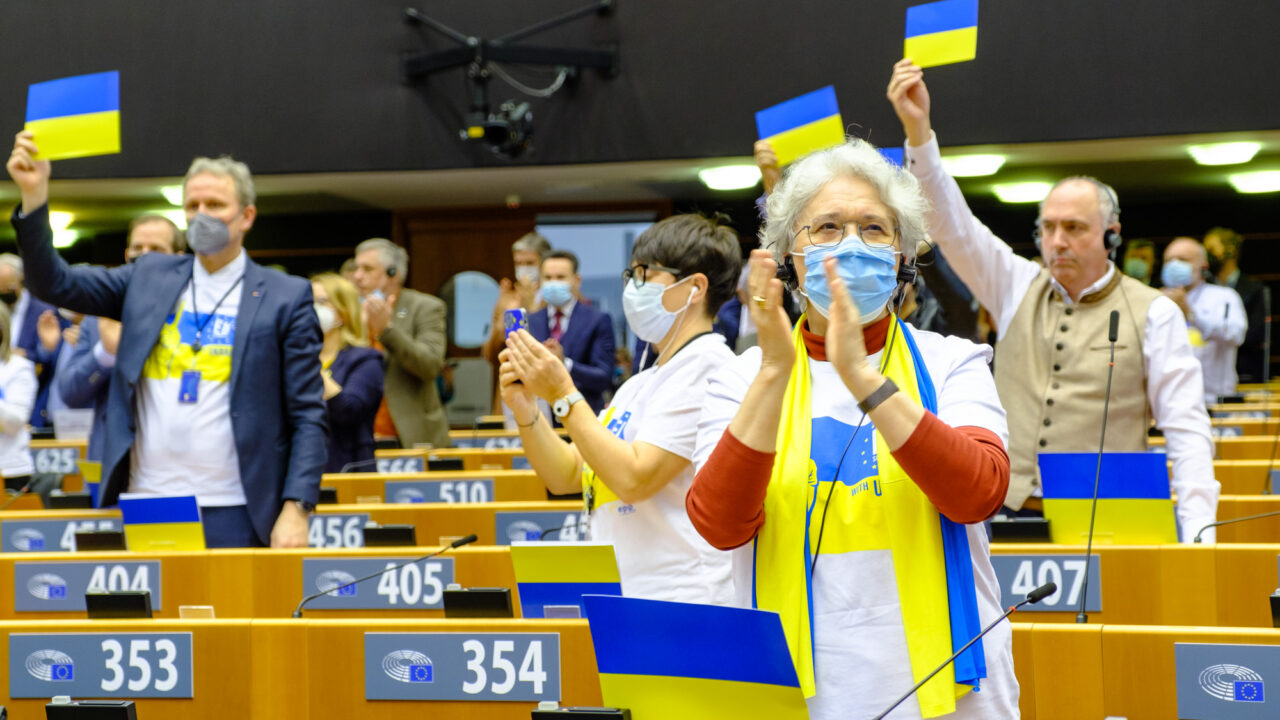What now?
In this age of danger, we will need a strong EU and a strong NATO
With Russian President Vladimir Putin’s massive invasion of Ukraine – using two-thirds of Russia’s army – we have moved from a tangled era to an age of danger.
It was right to try to respond with diplomacy to the threat that had so clearly built up in recent months – even if some of the declarations made in that process will probably appear a little naive in the eyes of history.
But the time for diplomacy is over. Now it is only with action that we can face up to this age of danger.
Sanctions are the obvious measure to use. And they are being implemented; decisions have been taken. Perhaps decision-makers around the table in Brussels should remember that this crisis has become far worse than most of them predicted and believed possible just weeks ago – and should adjust their decisions accordingly.
But sanctions and counter-sanctions will affect us too. No nation will escape the consequences of Russian President Vladimir Putin’s aggression. And EU member states should immediately recall their ambassadors to Moscow for the time being.
The truth is that everything that various Russian diplomatic representatives – from Foreign Minister Sergei Lavrov downwards – have said in recent weeks about “there will be no Russian invasion; this is all just Western hysteria” was untrue.
So, at this stage, it simply does not make sense to talk to Russian officials who are either deliberately lying or have no leverage because they know nothing.
And I think that we should skip the charade of calling Russian ambassadors to foreign ministries. They can see what we think on TV. They should not be given the opportunity to tell our representatives new lies or ask questions about what we are going to do.
In my opinion, every EU member state should expel all Russian embassy personnel who have been identified as belonging to Russia’s security or intelligence services.
This is not another protest, but a necessary protective measure.
These so-called agencies now have the task in Ukraine of seeking out, arresting, or otherwise neutralising everyone who stands in the way of Putin’s goal. Everybody fighting for Ukraine’s democratic structure will be described as “fascists” and made the object of what Putin calls “denazification”. Terrible days lie ahead.
But there is every reason to believe that the mission of these agencies will be extended to our countries as well. Here, too, they will have the task of identifying, opposing, threatening, or intervening against people whom they see as supportive of a Ukraine that fights back.
Putin has shown that he is even prepared to kill people in other European countries. Expelling Russian embassy personnel is a necessary protection for us. We must no longer be naive.
Putin’s objective is to set up a puppet regime in Kyiv that he controls completely. Some quisling can certainly be recruited. But we should treat such a government in the same way we treat the Taliban regime in Kabul. And our diplomatic relations should be with Ukraine’s legitimate leaders for as long as is possible – inside or outside the country.
Ultimately, these leaders are the representatives who we want to continue to meet at the United Nations and other international forums. In this regard, the European Union will be confronted with various difficult issues in the future. Hence, we should carefully prepare for this discussion now.
It goes without saying that we must receive those who are now forced to flee their home country and wish to seek refuge in Sweden. On this point, we cannot be caught floundering. Our signal must be clear. I have no doubt that the overwhelming majority in Sweden supports this.
Where possible – in Ukraine or near its border – we must provide humanitarian aid. We have aid organisations that can reach different parts of the world quickly to help people in need. Ukraine’s western neighbours may need our help.
The fact that we now need to further strengthen our own defence should not be up for discussion. Clearly, there are military shortcomings that must be addressed immediately. And decisions on this can be taken quickly.
But there also needs to be a major review of the lessons of this crisis: Russia’s demonstration of military capability and political will goes beyond what most of us previously reckoned with.
Solidarity can never be a one-way street
NATO is reinforcing its presence in Estonia, Latvia, and Lithuania. This is important for their defence, but it is also about the protection of Sweden. It is NATO’s presence, with its clear link to US power, that these countries naturally want. But should Sweden also be asked to participate, we will be there.
We build our security on the idea that the US and NATO will come to our aid as well. So, whatever they ask us to do in this critical situation, we should say “yes”. Solidarity can never be a one-way street.
In this age of danger, we will need a strong EU and a strong NATO. And, apart from improving our own defence capability, our contributions to this are the most important thing we can do now for our own security.
With Putin’s invasion of Ukraine, many dreams of the Europe we wanted to build are now shattered. But let us not forget that we also dreamed of a democratic Russia in open cooperation with Europe.
The tragedy is deep but, unfortunately, this is the reality we face. The age of danger will make new demands on us.
The European Council on Foreign Relations does not take collective positions. ECFR publications only represent the views of their individual authors.



